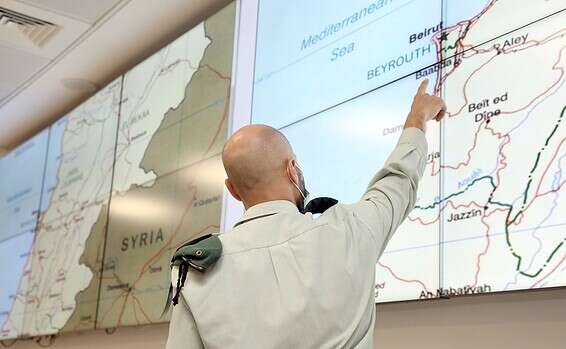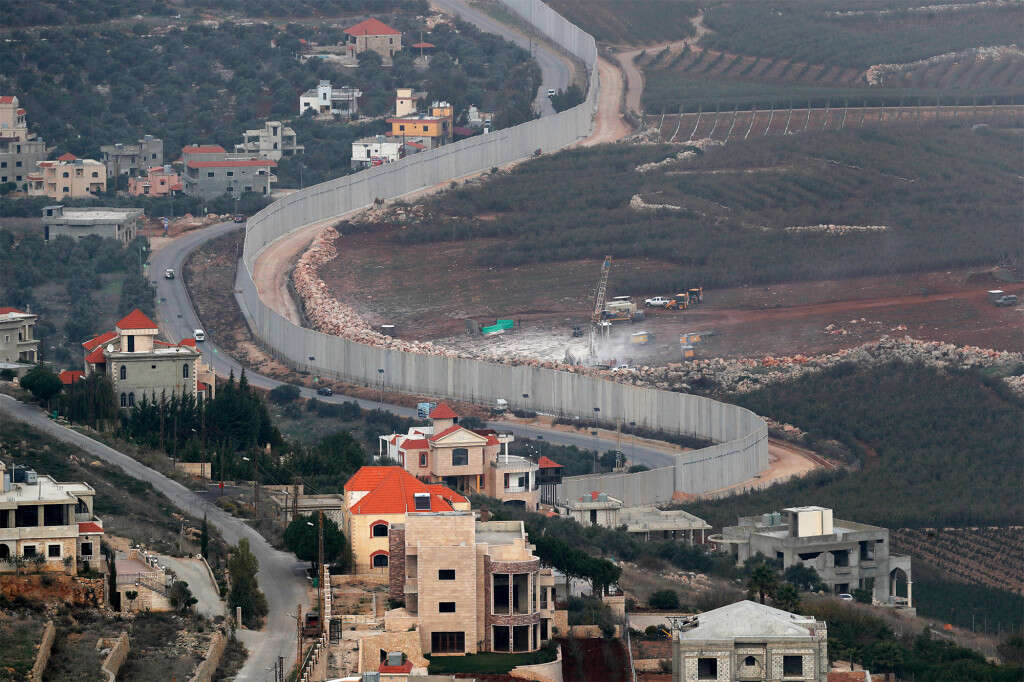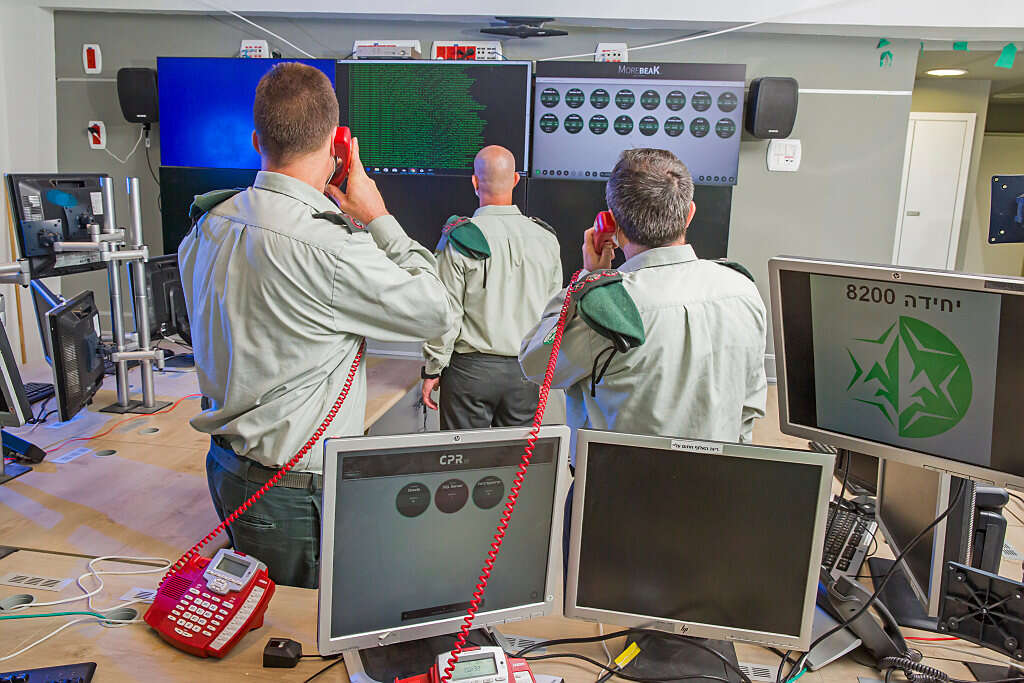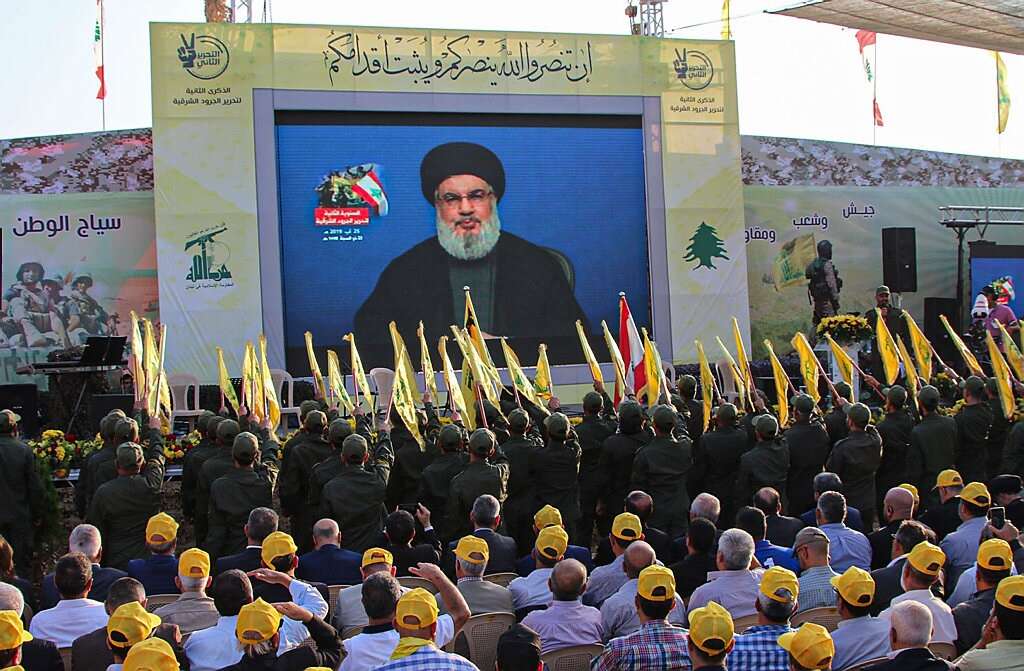by Yoav Limor
During his childhood in Lebanon, K. never thought he would one day serve in the IDF. In the early 1990s his father, spurred on by Zionism, decided to immigrate to Israel. When he was drafted to the army, Unit 8200 understood they were granted a gem.
 |
| "The connection with everyone was lost." Sgt. Maj. K. | Photo: Gideon Markowicz |
If K. has one dream, it's to go back to Beirut. To walk around the neighborhood he grew up in, to meet his old neighbors and friends. To sit in restaurants, to go for vacations in the north like he did when he was a kid. "I'll be the first to go to Lebanon once it's possible," he says.
Sergeant Major K. is known in 8200 as "The Lebanese". He came to Israel from Lebanon with his family, among the last Jews who lived there, and was drafted into the IDF and made a career in Unit 8200 focusing on his former home - Lebanon and the fight against Hezbollah, who took over the country he grew up in.
He's 39 years old, married with two girls aged 8 and 3. His perfect Hebrew can be misleading: when he came to Israel, aged 12, he didn't speak a word. Everything he learned he learned by himself. Word after word, sentence after sentence.
His mother tongue is Arabic, and just like any educated Lebanese, he also speaks French and English. He studied in a Christian school, and most of his friends were Christian. "Most of the Jews left before us. Most of them after the Six Day War, and then after the Yom Kippur War. Those who stayed, dispersed after the civil war began in 1975, many moved to France or Canada, because they knew how to speak French, and also to Brazil."

His parents lived in Beirut. "They were convinced that in a few months the war will end, but like all the Jews who remained in the city, they decided to go up a bit north, to a more remote mountainous area. They were sure they would return when the fighting subsided, but it didn't, and we stayed there."
His father was a successful salesman and his mother a housewife. He remembers a normal and happy childhood of a regular family: two parents with four kids, K. and his three sisters. In retrospect, he can say that during those times there was considerable persecution of Jews, even though his family never felt it. "I don't remember being scared to say I'm Jewish. Our neighbors knew we were Jews. My father came from a religious home, and we would celebrate the major holidays – Passover, Rosh Hashana."
They would get matzos for Pesach from Syria, where there was still a large Jewish community, with a chief rabbi, kosher slaughter and bakeries. "In Lebanon all that disappeared years earlier, but we learned to get by. We lived among Christians, but we upheld our Jewish lives. Father prayed at home. On Yom Kippur the neighbor would come over before the fast ended to warm up our food, and the neighbors would move our car so we didn't desecrate the holiday."
Q: Weren't you scared?
"I was a Lebanese Jew. I was accepted like they accept a Lebanese Christian. I studied in a Christian school that was somewhat religious, and anyone who needed to know - they knew I was Jewish and didn't attend religious lessons. I didn't go around screaming that, but I was never ashamed or scared to say I was Jewish."
They avoided going to the Shiite areas of Beirut. "We lived in a Christian area, which was protected. The moment you ventured a bit south, you were exposed. My father didn't like going to these areas. He was connected to military people who would give him passage, but he was very careful."
He remembers many vacations during his childhood in Lebanon: In the snowy mountains, and on the beach during summers. Long vacations that sometimes lasted the whole summer.
During holidays they would come to Israel, to visit his mother's family. Today it sounds like science fiction, but in the 1980s they would get in their car, drive south to the border, pass through Rosh Hanikra, and when the vacation ended go back home. "I remember holidays, the hotel in Nahariya. We would usually come for Rosh Hashanah, because it coincided with the vacation in Lebanon." His father was the only one then who spoke Hebrew. The rest of the family spoke with their relatives in Arabic.
At the end of the 1980s the visits became less frequent due to the security situation, and the family slowly began to think more about leaving Lebanon and moving to Israel. "My father was Zionist, and he wanted to live again in a warm and embracing Jewish Zionist community."
At the end of 1993, they made the decision and K.'s family prepared for the move. As opposed to Syrian Jews, who had to escape without any belongings, Lebanese Jews left in an orderly fashion. K.'s family told their neighbors they were leaving for America, packed their house, including the furniture, called the movers and put their possessions on a ship that sailed to Cyprus, where they were greeted by Jewish Agency officials. After a few days waiting, in December 1993, they flew to Israel.
The move to Israel wasn't easy, especially for his parents. A different civilization, different language. K. and his sisters had to get along by themselves. After six months in an immigrant hotel, they moved to Holon, where he first entered the Israeli school system, in the 7th grade. It wasn't smooth. "Kids can be cruel sometimes. There was unpleasant name-calling. They called me Hezbollah. Today I understand that the cruelty wasn't meant really to hurt - that's what they knew."
As a defense mechanism, he tried to hide that he came from Lebanon. Until he was drafted. The Intelligence Branch didn't miss the fact that he was born and grew up in the neighboring country to the north. In a unit that works hard to train Arabists, K. was a diamond. Not only one whose mother tongue is Arabic, but who also knows Lebanon not only from books or intel, but really, from the inside. A real Lebanese, who knows the culture, traditions and food. "A real Lebanese. A Lebanese Jew," as he calls himself.

He was drafted in 2000 to Unit 8200, the IDF's top Military Intelligence unit. He received training and served as a radio technician. He listened to calls, analyzed data, sent messages. He quickly understood there's a difference between "his" Lebanon, the one he loved and grew up in, to Hezbollah, the enemy. "Not all the Lebanese residents that I know are enemies. It's an important distinction to make."
In his eyes, Hezbollah is not only an enemy of Israel, but of Lebanon. "Most of the Lebanese people suffer from Hezbollah's presence. With what I do today, I not only serve the state of Israel, I also serve the Lebanese people."
He has no doubt that in the area he grew up in Hezbollah is a threat. "They control everything, and that's why they look after their own personal interests, the Shiite community - and those who aren't connected to Hezbollah, are severely harmed."
Q: Are you in touch with friends, neighbors?
"No. The connection with everyone was lost. At first my dad still had ties, but they slowly disappeared. It's not like today where there's email and Facebook."
The move to Israel wasn't easy for his parents, either. "In Lebanon, our door was always open. A neighbor came in, a neighbor went out, and suddenly here is the mentality where everyone is closed inside themselves. Everyone worries about themselves and their own families. It was hard for them to accept that they won't have friends like they did in Lebanon."
Q: Do you miss it?
"My father misses it a lot. Last summer with the explosion at the Beirut port, the first thing I did was run to watch Lebanese TV stations to see what was happening, and then I called Dad. It was very hard for him to digest. His childhood was there. The memories. I asked him when that country would finally find some peace."
His father still lives in Holon, and despite his age works in security, so as not to come home empty handed. His mother passed away eight years ago, and his sisters keep the Lebanese tradition, mostly by cooking food from there. He speaks with his father "half Hebrew half Arabic" even though "Dad thinks in Arabic, Arabic is the most comfortable for him."
Q: And when he sees what Hezbollah does in Lebanon?
"He doesn't think much about that now. He thinks more about politics."
Q: Lebanese politics?
"Of course. He's always watching the Arabic channels."
Q: And what does he say about the mess there now?
"That we're lucky we left. My parents sacrificed a lot by leaving, each of us paid a price. But today everyone is settled, and he's happy about that."
Q: Do you ever imagine what would have happened if you stayed there?
"Of course. And I probably would have found some way to leave, too. In Lebanon there is conscription at age 18, so if I had stayed it would have been a problem."
Walks with his head held high
During his service he moved between arenas. He also worked on the Palestinian arena, but most of his service was spent dealing with the Lebanese arena. During the Second Lebanon War he was at a northern base of the unit that was under fire, and dealt with "life saving" as he calls it. "My job was to save the lives of soldiers who were in Lebanon, and we did it. I can say without a doubt we saved the lives of a few soldiers."
During one of the incidents, they alerted a force inside a house of an anti-tank missile fired at them. The force evacuated the house - and survived. "That was a difficult period. You're being bombarded, you need to make a switch and move to 'war mode', but the mission is above everything."
And amidst all this, thoughts on Lebanon. His Lebanon. "I long ago made the distinction between me being Lebanese and being Israeli. I don't think I'm hurting Lebanon in any way. Like I already said, I think I'm doing good for them."
As such he no longer hides his identity. "I used to hide it. Today I hold my head high. I'm K.. Jewish-Lebanese. Everything I had when I came here - the shame, the desire to act as if I was born here and not there - all that is gone."
Q: What do you tell the young soldiers you meet?
"Everything. How life was there, the summer vacations, the restaurants, the food. The young guys don't really understand it, that there is a Lebanon that isn't Hezbollah. A different Lebanon."
K. makes it clear he differentiates between Lebanon the state and Hezbollah, which grips it with an iron fist.

"It's not the same thing. I lived with these people. I know their opinions, their culture. But I also work on the northern front and see the evil. And there's a major difference between the two."
As time goes by the differences become blurred. Hezbollah is gradually taking over Lebanon and its institutions, and in many ways its interests have become those of Lebanon. And yet, the distinction is important to him, even though he focuses on the enemy - Hezbollah - and less on the sentiment, on the Lebanon he left.
Hezbollah, he says, is a smart organization that learns lessons. But it's also an organization that is aware of its limits and who is opposite it. "You can't ignore Hezbollah and its strength, but neither our capability and strength, and this they know very well."
Unit 8200 has been through dramatic changes during his service in the unit, especially the transition from the world of signals intelligence to the world of cyber. If in the past he mostly dealt with listening to calls, today his world includes many types of messages and other data. The unit has many other Arabists, but K. is the only Lebanese, and this is a unique source of knowledge.
As such, his familiarity with Hezbollah is intimate. Last year he dealt quite a bit with thwarting attempted attacks by the organization on the northern border, as a response to the killing of one of its militants in an attack attributed to the Israel Air Force in Damascus. "I'm not ashamed to say that I wake up every day with a certain amount of vigilance, in knowledge that things can change any second."
Q: And when you hear Nasrallah say there will be revenge, what do you do?
"Our job is to always look for an intent to attack, whether or not Nasrallah speaks to the media; and for that we need to be focused and sharp. Yes, we look for needles in a haystack. It's not simple. But we know the job."
Q: And when you don't succeed? You're not success wizards.
"Then the feeling is very difficult. And if there is a soldier killed or injured, your world falls apart. But the great thing about 8200 is learning lessons. We're humans and we make mistakes, but the idea is to know how to fix those mistakes."
Q: And how does it feel to be the only Lebanese in the business?
"It's kind of funny to say, but the feeling is like a weight on my back because I have a great responsibility. First of all, to my country, and yes - also to Lebanon, or at least part of its citizens. And part of my missions as I see it is to guide the young soldiers and train them. To teach them the culture, the language. The correct pronunciation."
As part of his job, K. led a team in operation Northern Shield, which exposed and neutralized cross-border attack tunnels Hezbollah dug. "We took a strategic capability from them. It has great significance. I was very proud, I felt I achieved closure. They worked so hard on that, and in the end a Lebanese came and exposed and thwarted their plans."
Q: The Lebanese who thwarted the Lebanese.
"Hezbollah. The Lebanese I know are not Hezbollah. I never knew Hezbollah activists. My friends were Christians. Good people."
Q: This article will probably be translated to Arabic, published in Lebanon.
"That doesn't bother me. I'm here to protect my country. Let them translate."
Q: You say you are a Lebanese patriot. They will say you're a traitor.
"I'm an Israeli patriot. Born in Lebanon, but my heart and soul are Israeli. And yes, I want to save Lebanon."
Finally, he says that when the Abraham Accords were signed with the Emirates and Bahrain, he thought of his homeland. "My dream is that someday this will happen with Lebanon. I will be the first to go there."
Yoav Limor
Source: https://www.israelhayom.com/2021/04/05/my-heart-and-soul-are-israeli-but-i-want-to-save-lebanon/
No comments:
Post a Comment